Is RVing environmentally friendly?
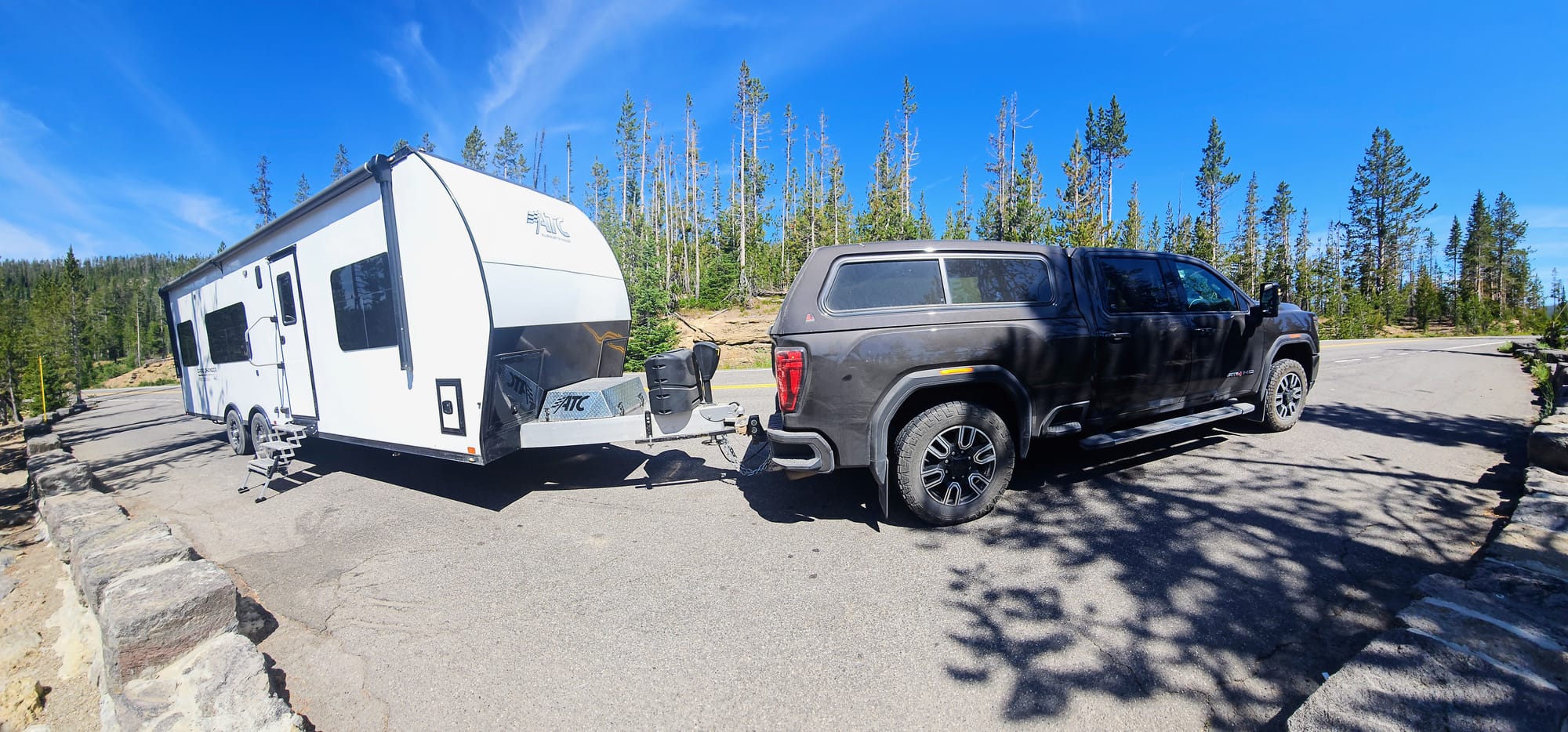
This post contains Amazon affiliate links. Items purchased through these links may provide us compensation. Thank you for supporting our blog!
Last summer, halfway through our first year of living in an RV, I got a new job working as a consultant for a cleantech company. I work with companies that want to integrate environmentally-conscious technologies into their organizations. I've always been one to keep climate-consciousness at the forefront of my mind, so I couldn't help but wonder, would living in an RV help or hinder my footprint on this planet?
At one point I talked with my boss about my environmental footprint. After all, I use propane for heat, hot water, and my stove, and propane is not as clean as natural gas or low-carbon electricity. Furthermore, RVs are poorly insulated, so when we camp in cooler weather (which is our preferred temperature), that propane heating system is working overtime.
Not to mention, towing a 12,000lb trailer around the country with a 6.6L V8 gas truck doesn't exactly give great gas mileage!
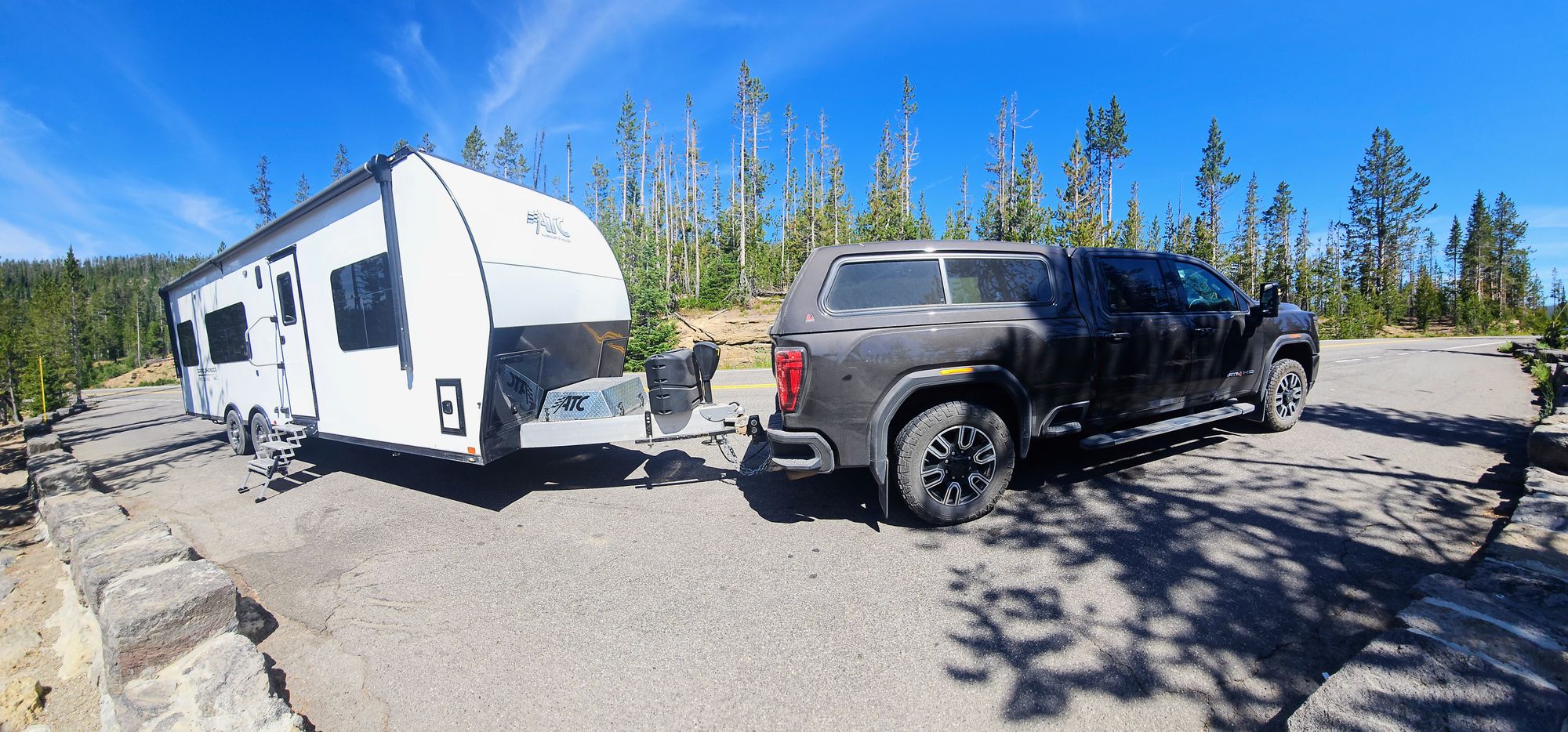
But, as you might expect given my field of work and my ivy league nerd brain, I've thought about this a lot, and nearly two years of RVing in all different conditions has allowed me to continue monitoring our environmental footprint and make changes along the way. Turns out, a lot of RVers feel guilty that they're lugging giant gas and diesel-guzzling vehicles hundreds, even thousands of miles. But when we dig deeper and compare our nomadic lives to life on the grid, in a house, are we really culprits of the earth's environmental debilitation?
Gasoline
My first car after college was a Prius, and when I met Nicole, she drove a Ford Fiesta. For all of you who were around us when we got our beast of a truck, you know that we were fish out of water. We prefer small vehicles, and Clyde is anything but small. The learning curve to drive him was just as big as the truck itself. We also like to drive as fuel efficient of a vehicle as is practical for what we need to do. Shortly after we rescued Tanner, we switched to a small crossover SUV, which came in handy for transporting him, his dog friends, harps, bikes, and SUP boards. Fuel efficiency before RVing: 30 mpg.
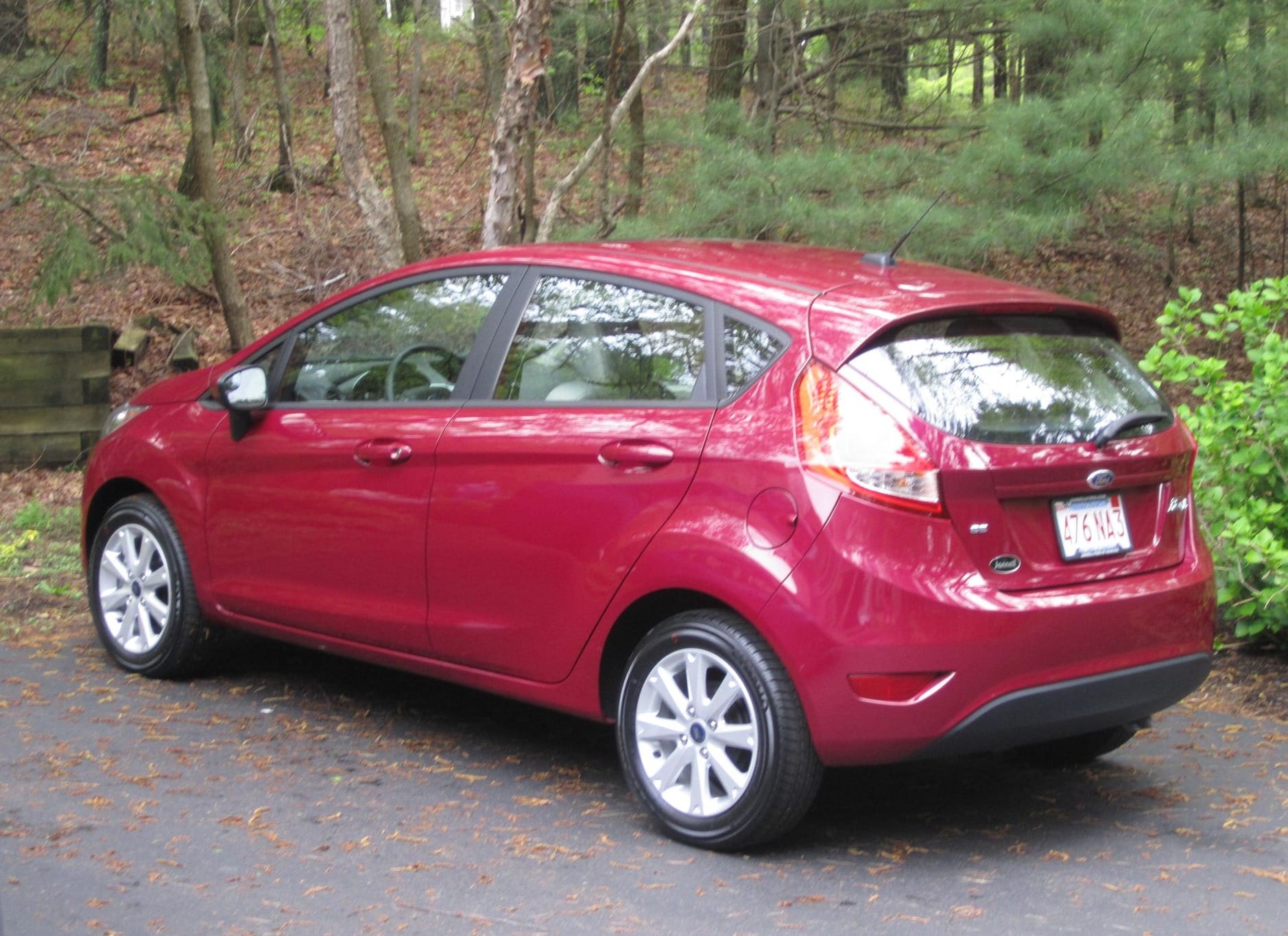
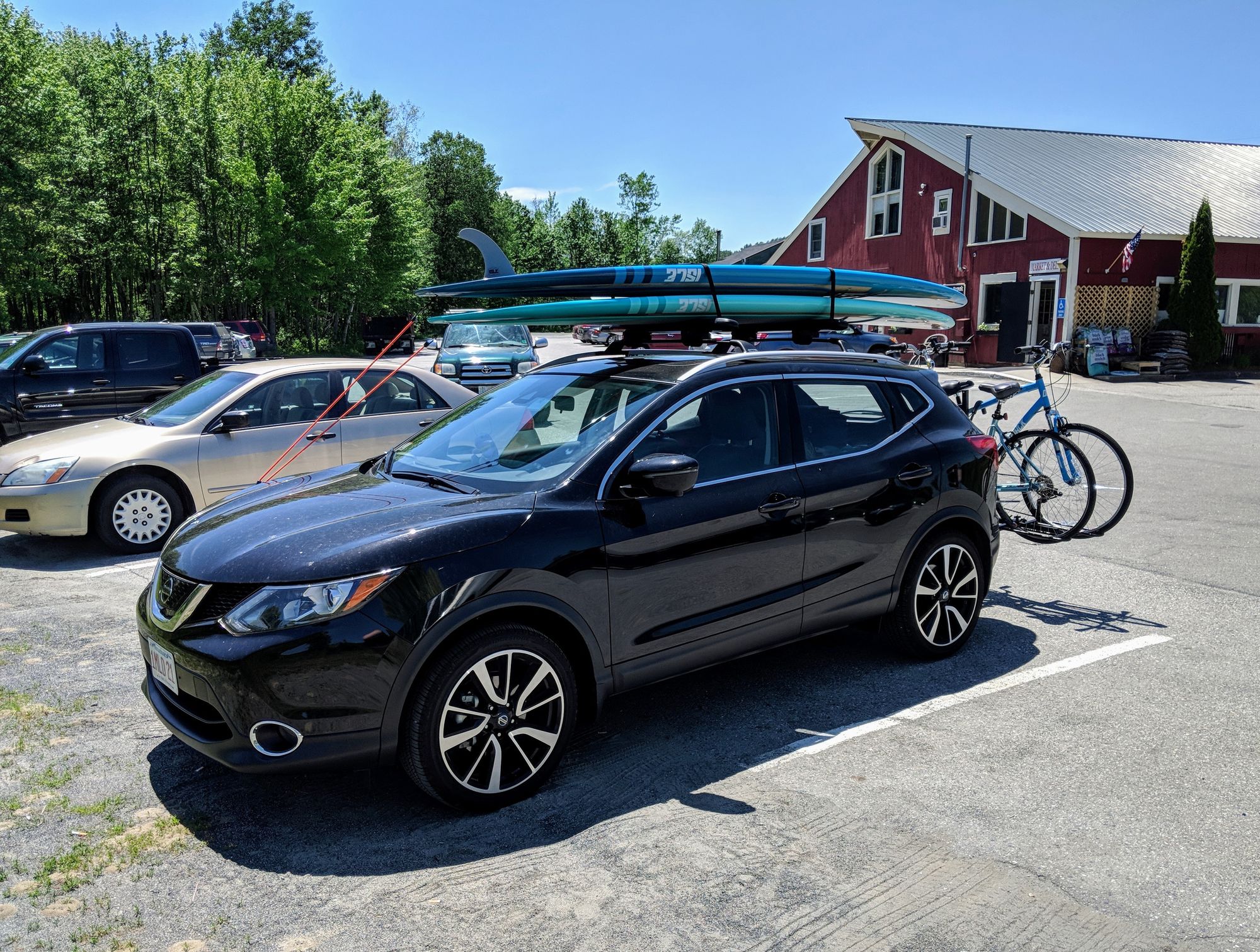
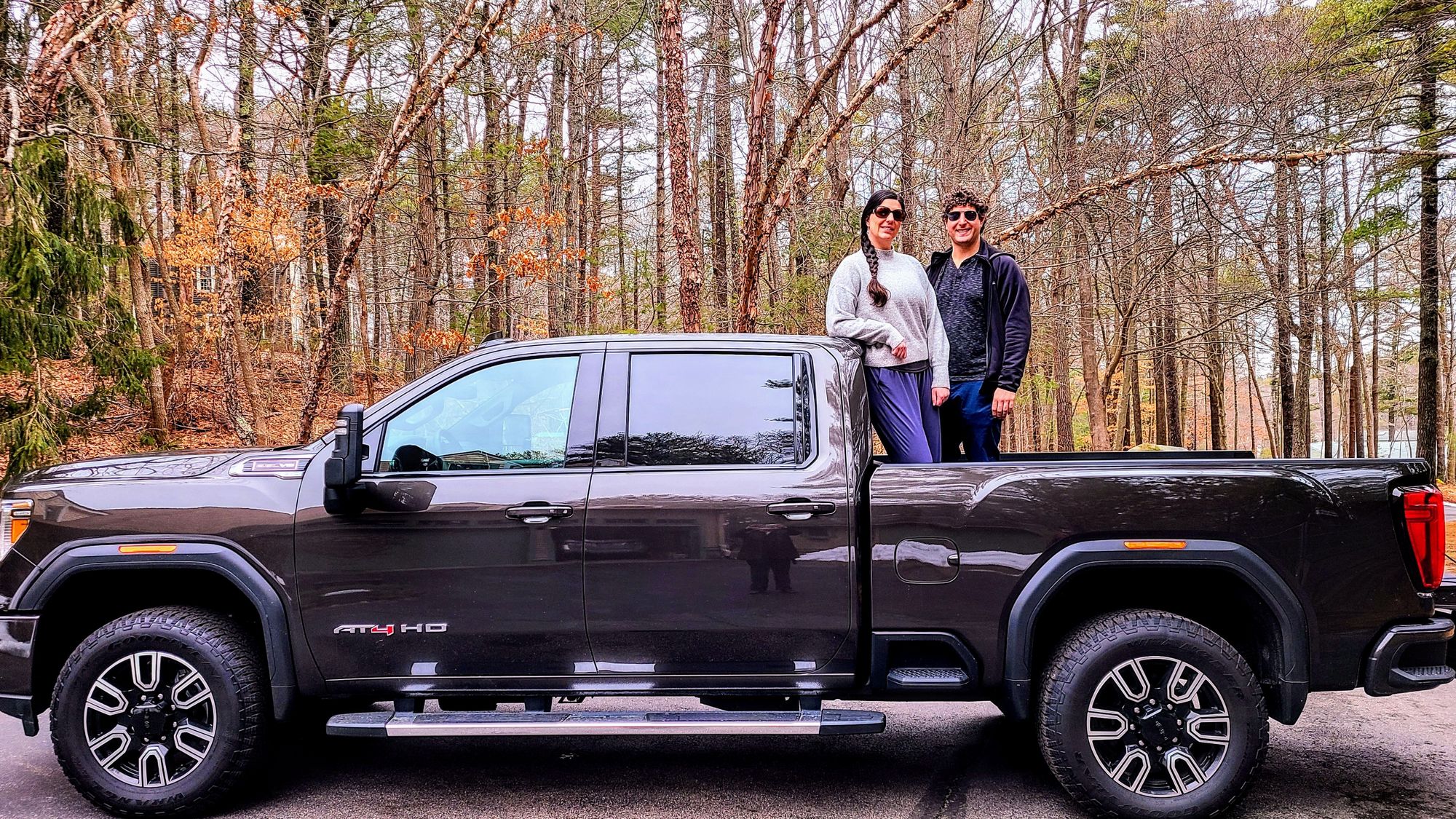
We've gotten a tad bit bigger over the years
Obviously, switching to a pickup truck worsened our gas mileage. And our
truck is gas, not diesel, so our mileage when towing is below average for RVers. Fuel efficiency in the truck: around 15 mpg not towing, 7.5 mpg towing. Still, it’s not all bad news. We do a lot less local driving than we did in Massachusetts. Instead of driving to our favorite grocery store several towns away, we shop wherever is locally convenient. Instead of having to drive miles every time we want to go for a walk, we often have trail access right from our campsite. RVers have a tendency to automatically think about all the miles we put in on travel days, but that's only a small subset of our days on the road. It's the local miles that really add up in the end. Even though we travel fairly quickly, opting to spend 1-3 weeks on average in one location, we don't have extremely long travel days, usually keeping our miles at 250 or less. Keeping our travel day distance down also means when we're settled in a place, we tend to explore only a small radius around our campground. For instance, we camped right outside Devils Tower and barely had to drive anywhere to explore the area. Then we moved to Rapid City, where we remained local for 2 weeks. Then we went to Wall, SD and explored the Badlands, which are right next door. We could have traveled all the way to Rapid City and used it as our home base for western SD, Devils Tower (~110 miles away), and the Badlands (~60 miles away), but this would have actually added up to more miles, as we'd be taking long road trips with the truck. Sure, we wouldn't be towing, but towing from one campground to the next mostly consists of straight shots on highways. The miles exploring in the truck add up fast, but staying local, exploring the immediate vicinity around our campground, cuts the miles down exponentially.
The end result? Our annual miles driven in 2021, before launching, was 18,000. Our miles driven in 2022: 15,000!
But of course, we are getting lower gas mileage, so our annual gas use for driving went up a lot, from 600 gallons to 1,500. But when we were in a house, the driving miles for commuting, going to stores, going anywhere really, were baked into our lives. We really didn't have a choice of where to go when. Now, we’re in control of it each year, and so we always have the choice to slow down or stay in places with better fuel rates.
The other thing that RVers often forget to factor in is, now that we're RVing, how many of those destinations would have required a take off and a landing? We don't need to fly anywhere for vacation anymore. One cross-country flight for the two of us would burn almost enough jet fuel to make up for all the extra gas we use driving! I calculate that our net gas usage has only slightly increased compared to our pre-RV lives.
Heat and hot water
After we bought our house in MA, we made a lot of efficiency-improving upgrades. We switched from oil heat, electric hot water, and an electric stove/oven, to using
natural gas for all three, plus a gas clothes dryer. We also upgraded the insulation
in our walls and attic, and installed double pane windows. We made it as efficient as a house built in the 1960s can reasonably be.
The RV has much worse insulation than the house (the walls are only an inch thick!), and we get our heat and hot water from propane, which produces about 20% more CO2 than natural gas. It doesn't look good at first glance, but then we factor in size. We downsized from a 1200 square foot house, not including our (not well insulated) basement, to less than 250 square feet. We also have a slightly lower ceiling. Our heated space is only 1/10 what it was in the house.
Winter camping, of course, means pumping out more heat, and we willingly camp in MA for the holidays. But when we lived in MA all year, we were forced to brave an entire winter season, which meant running the heat nonstop for at least 3, usually 4 months out of the year. Now, we camp out in MA for a month, 2 tops, and it's the milder winter months of November and December. Our heating season has been cut down by about 60% factoring in winter camping time, weather, and our ability to heat our rig more quickly. We also have an electric space heater so we don't actually need to run our propane heat constantly, and because of our small rig with no slideouts, one tiny space heater can heat the majority of our trailer all on its own.
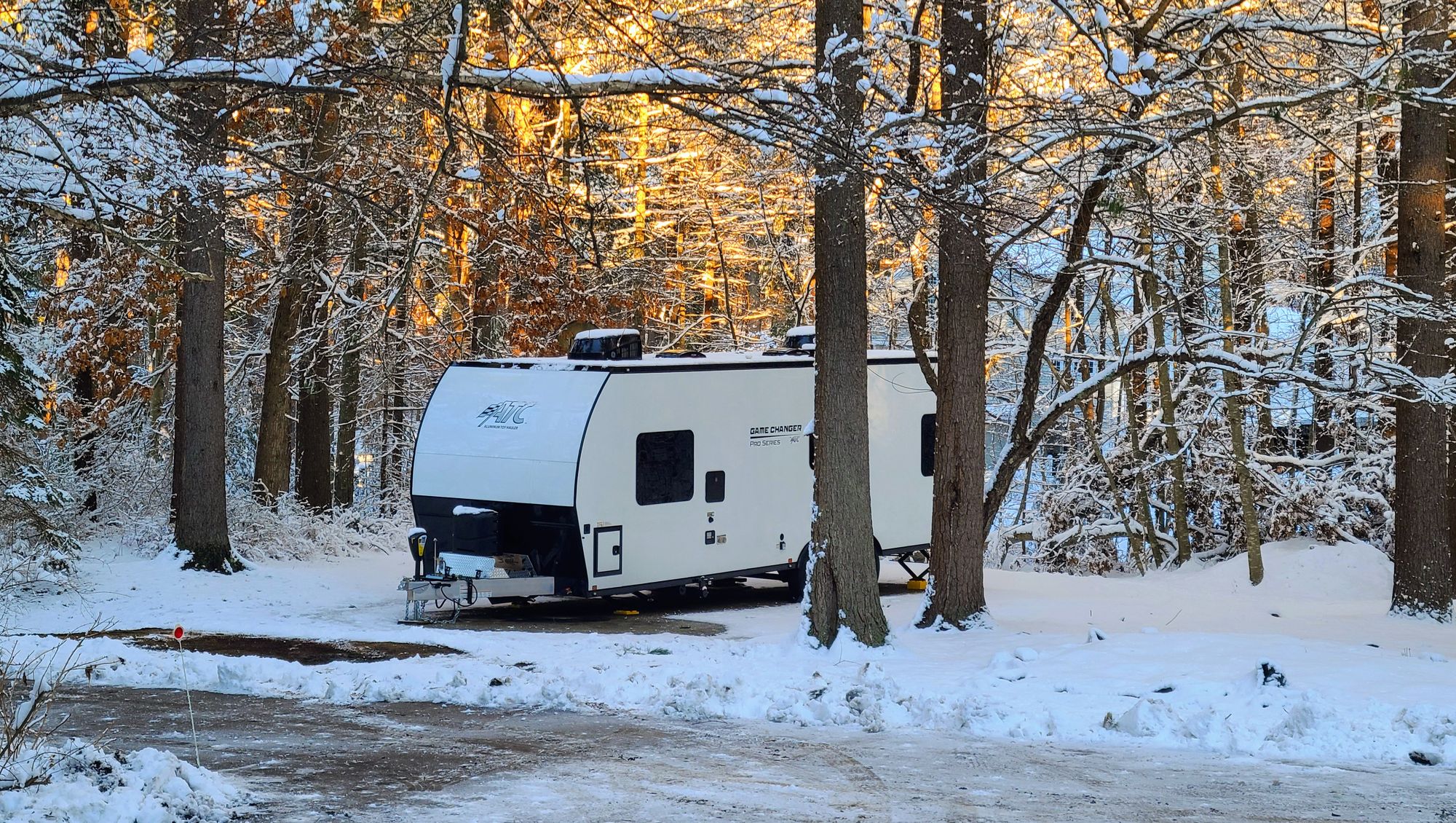
When we lived in sticks and bricks, I was showering 1-2 times a day on average, and I not once thought about how long I was showering for or how hot the temperature of the water was. Now, we take shorter showers less often, and we have a tankless water heater that doesn't need to keep water hot when we're not using it. Also, a lot of our cooking is done with electric appliances instead of the propane stove. Lastly, now that we have solar, we can use our space heater even when we're not on shore power. This means we can be off-grid and not reliant on propane.
End result: RVing reduced our heat and hot water energy use by 80%, and CO2
emissions by 75%.
Electricity
Living in MA, we used about 750 kWh/month of electricity (more in summer for central air conditioning, less in winter). In the RV we use much less electricity overall. There’s fewer appliances to run, our fridge is smaller, everything is designed to be efficient, and we need a lot less air conditioning. This past summer aside, we can usually escape the heat by staying north in the summer months or moving to higher elevation. We successfully did it in 2022, not so much in 2023. But every little bit helps, and even in the heat of the Wyoming desert this year, we weren't able to run both ACs constantly unless we ran our generator, which we couldn't always do (and didn't want to). We've gotten accustomed to finding other ways to keep cool in the RV, like opening the windows and using fans when we can, or keeping the blinds closed and putting our awning out, or parking in the shade of trees. There are even more things we can do, if we feel like we need to, like lining our windows with Reflectix-type insulating foil for better insulation.
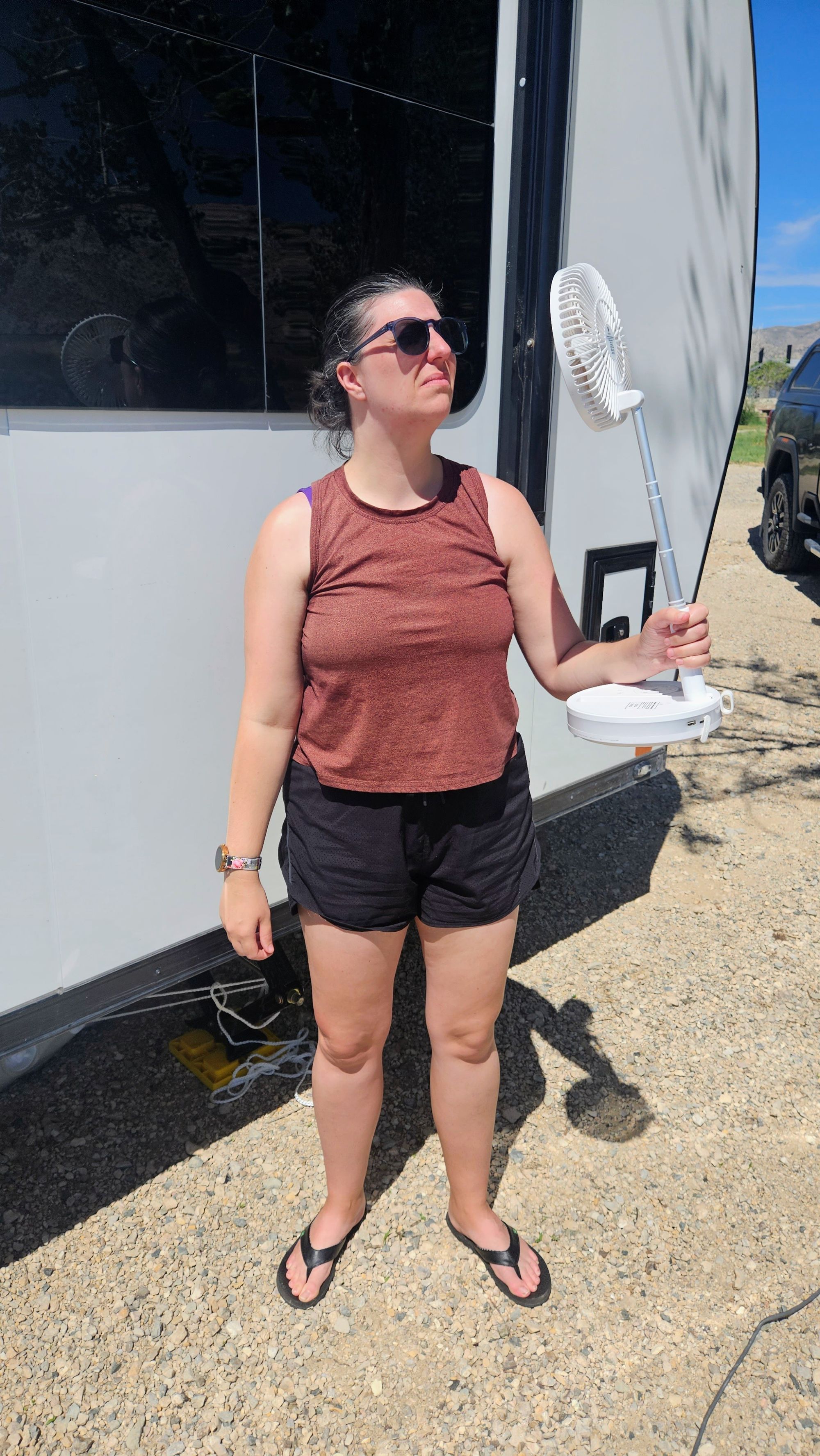
We use about 150 kWh/month of electricity now. But beyond the amount of electricity, we now have solar and therefore can spend a significant chunk of our time off-grid. Overall our solar panels are able to provide 80% of our
electricity. We get about 15% from the grid (when we’re plugged in, and also when
we do things like use electric dryers at a laundromat), and the remaining 5% from
our gasoline-powered generator. How clean the grid power is depends on where we are, and the generator is less efficient than a big commercial power plant, but no
matter what, this is still a big improvement.
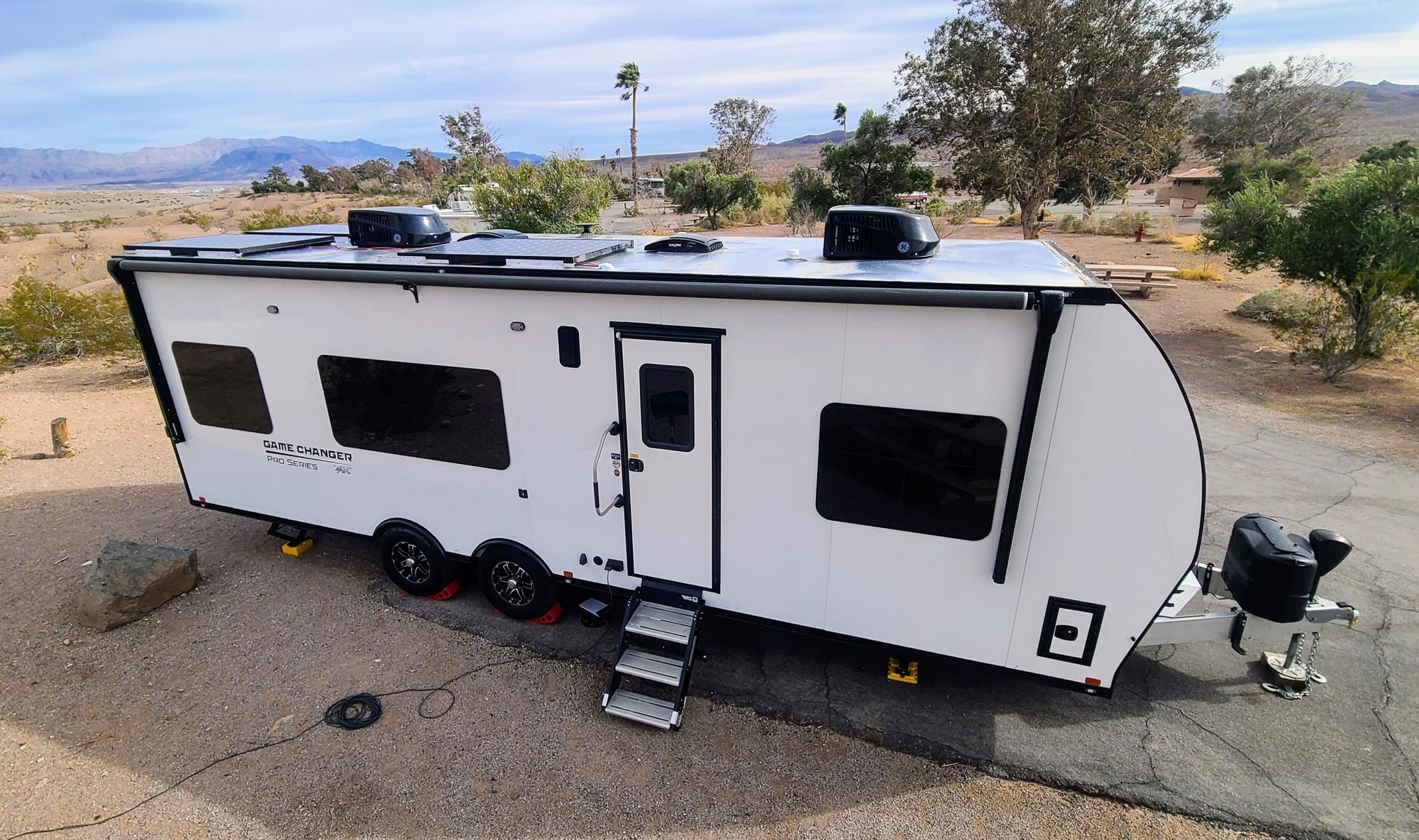
End result: We use 80% less electricity than we used to, and produce 90-95% less
CO2.
Water
Living in a house, the only time we had to think about water usage was when we paid our bill, and in MA, water is pretty cheap. Looking back, we used about 160 gallons/day. Slightly below the regional average, probably because we never watered our lawn. Yes, we admit it, we were terrible at owning a yard.
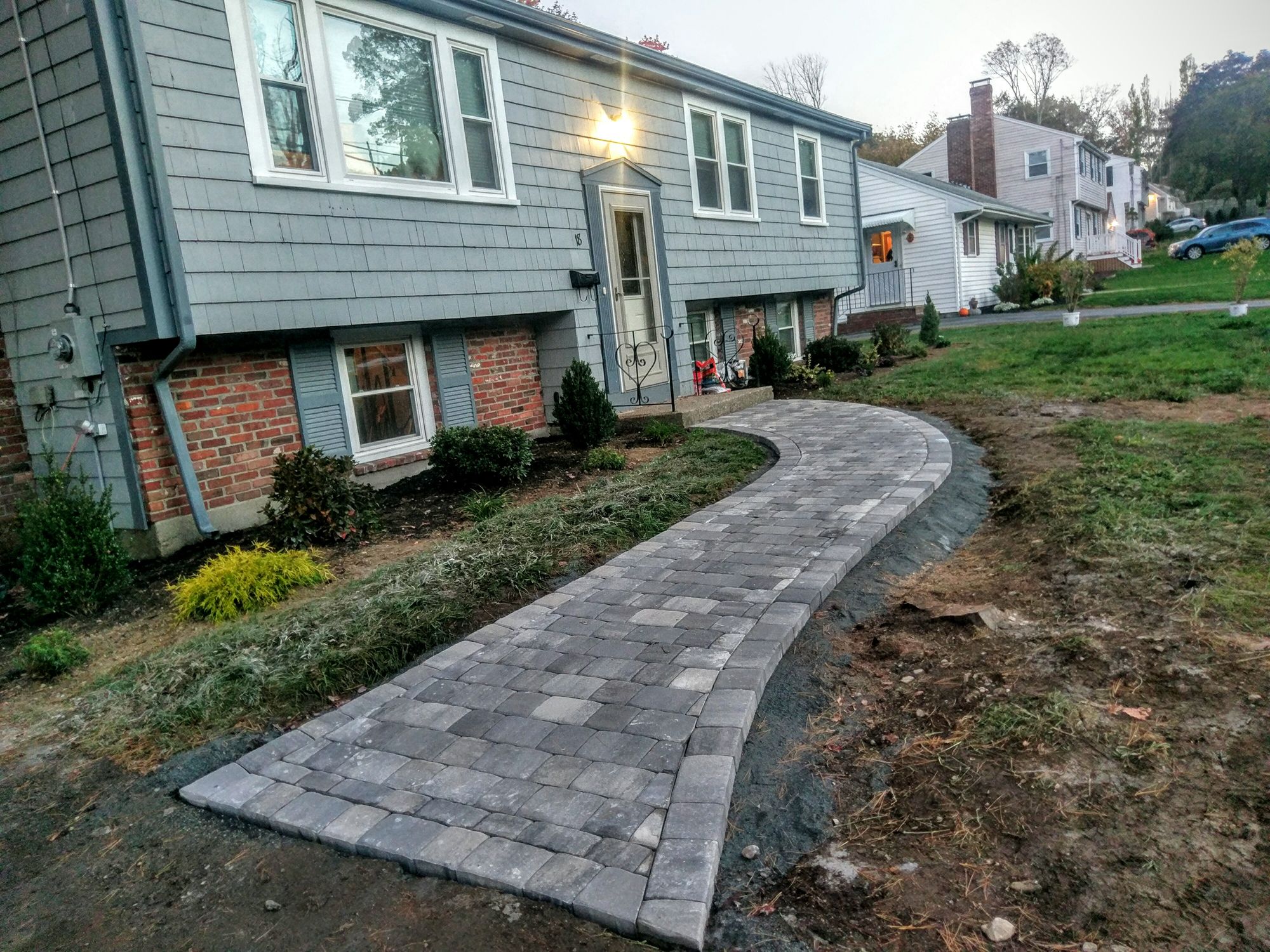
In the RV, we have to carry our water with us, and both the supply and the ability to store waste are limited. There’s lots of incentive to conserve. Plus, the plumbing
fixtures are all designed to use as little as possible, with toilets where you control
exactly how much water to fill and flush with, and showerheads with a button to
stop and start the flow. Home toilets, even newer, more "water efficient" ones, use so much water that with normal use by two people, flushing our old household toilet would have filled our current black tank in a single day! Now that same volume can last us 16-20 days (10-14 days before we installed our bidet).
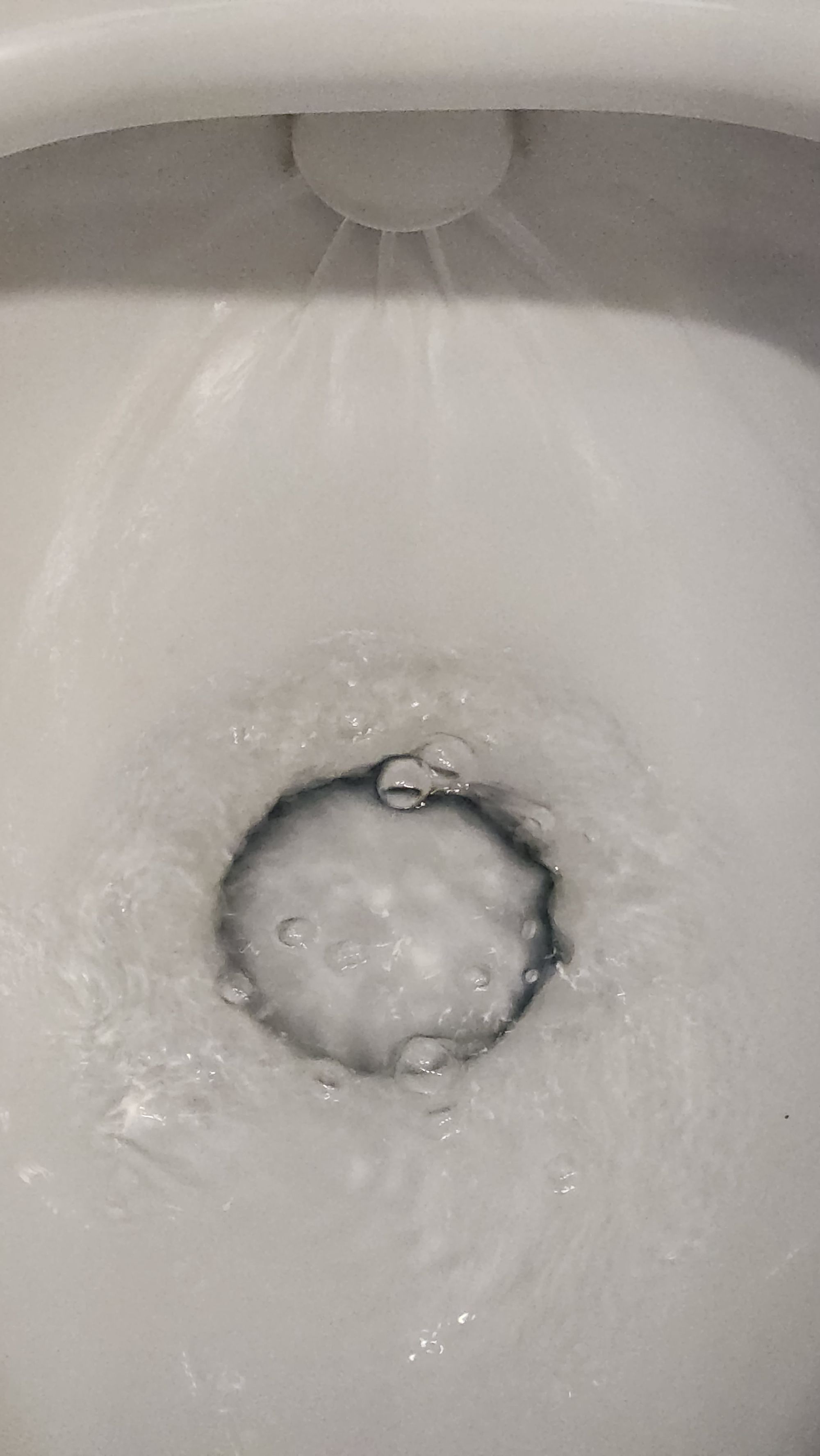
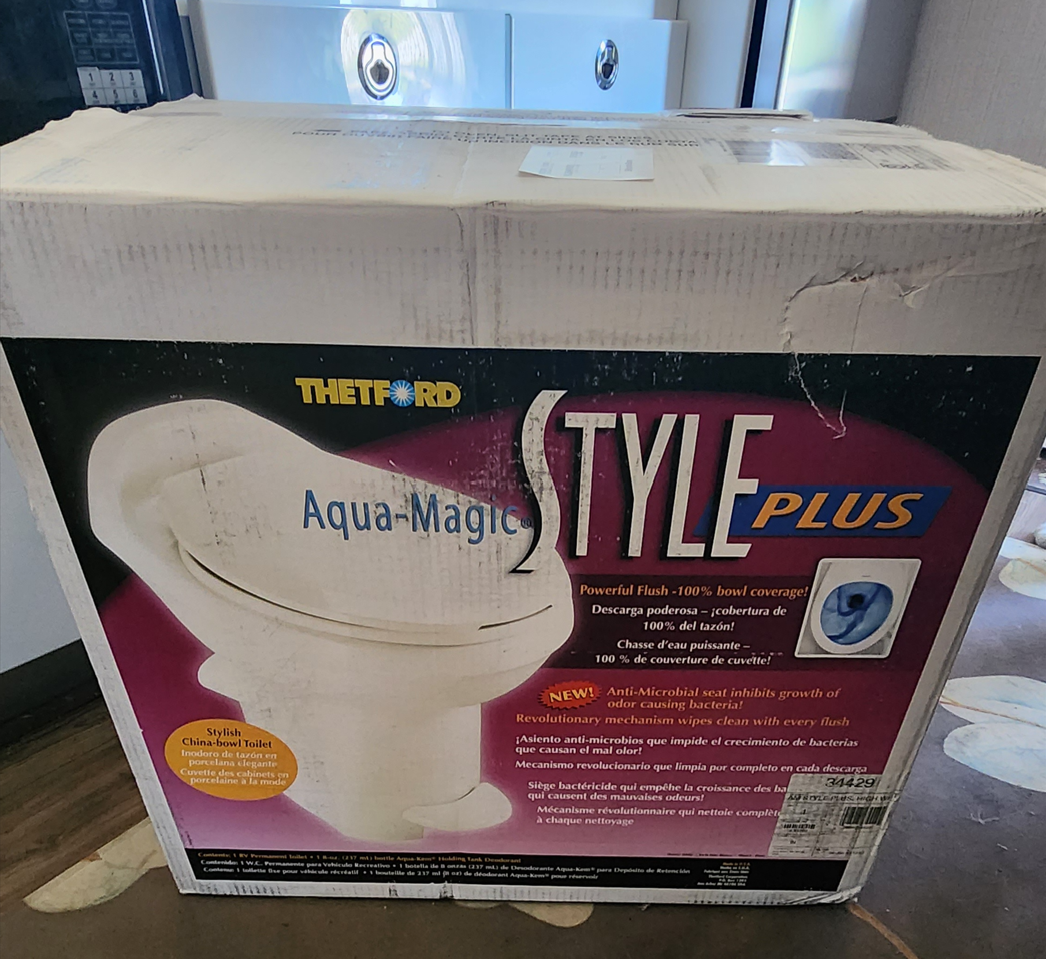
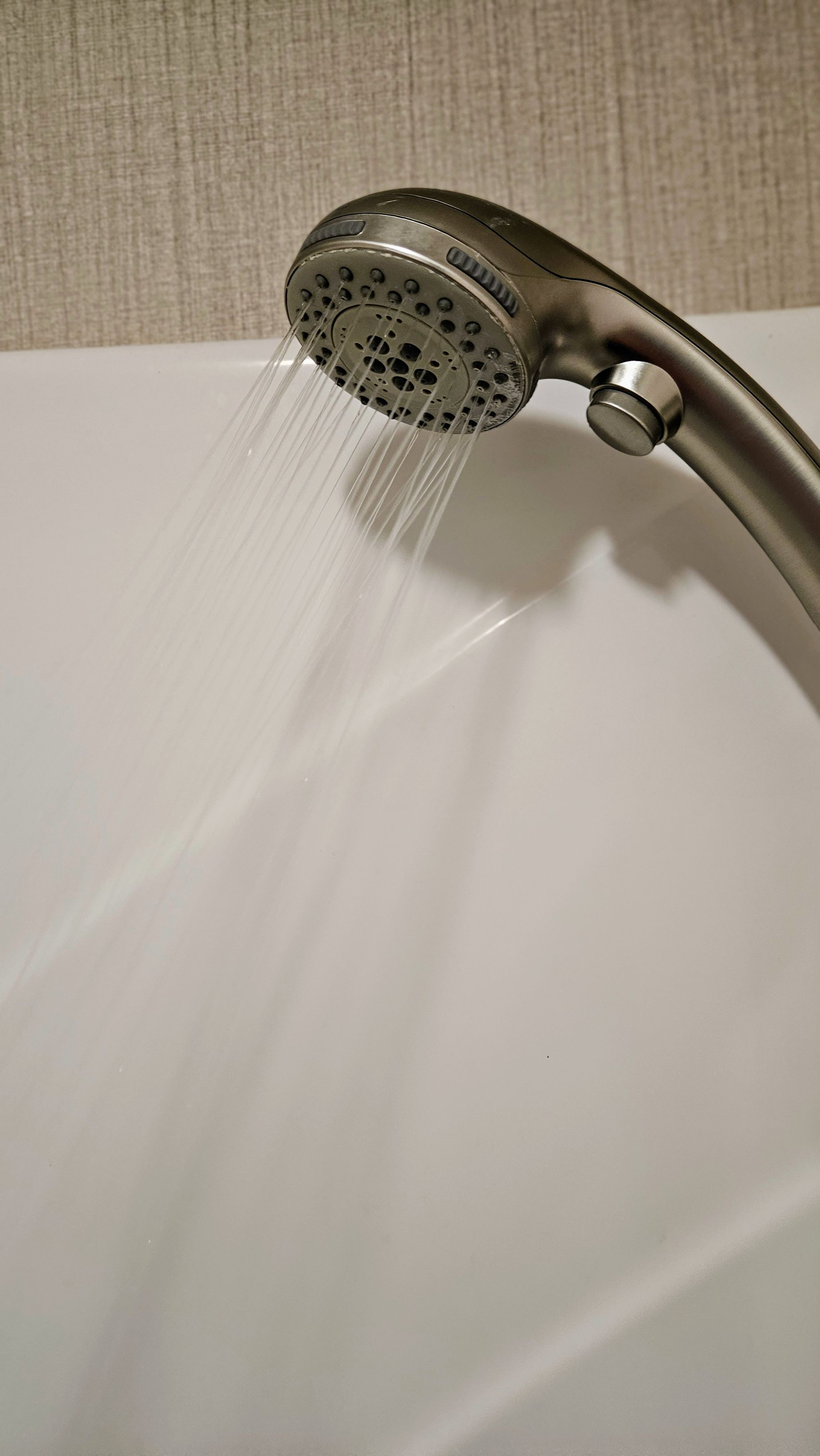

We wash dishes by hand, with the water turned off most of the time except for
rinsing, and we’ve gotten the rinse water volume way down with practice. We pre-mix dish soap with water in a spray bottle to make washing with the faucet off easier. We reuse plates and utensils more. If they’re only slightly used, we spray them with a water/vinegar solution and wipe clean, or use these handy food-safe wipes. We take fewer and shorter showers, and contrary to popular belief, showering less actually helps reset the body's natural skin barrier and deodorizing bacteria. It’s made me smell better and improved both our skin!
We use lower flow rates when we turn on the sink, and only keep it on as long as necessary. We do less laundry. We re-wear clothes more, which is easier because we spend more time in temperate weather and I for one definitely don't sweat as much than when we spent all year in the humidity of New England.
We wash a lot less bedding, largely thanks to travel improving our cat’s digestive health, and living in a small space making it easier to monitor where she is and ensure she’s diapered when on the bed. We’ve gone from an average of a load a day or more, to just about two (larger) loads a week.
Overall, when we’re boondocking and trying to conserve, we use about 5 gallons of
fresh water a day in the RV, total. 15 gallons if you add in what we use at
laundromats and to flush out our waste tanks and average it over the week.
End result: RVing decreased our daily water usage from 160 gallons/day to 15
gallons/day. 91% reduction.
Everything else
Everything so far has been about our personal, residential use of energy and water. However, in the US, industry, agriculture, commercial transportation, and other non-residential applications account for about 2/3 of CO2 emissions and close to 90% of water use (mostly for power plants and agriculture). There’s really no good way to figure out a single person’s total impact within all that, but what is certain is that on the road, we own and buy a lot less stuff. Aside from the truck, the trailer, and consumables like food and water, the total weight of all our possessions (including what we left in storage in MA) is <3,000 lbs, just 10-20% of what we had before. Most families own quite a bit more than we ever did in our house. Not to mention, the trailer itself weighs about a thirtieth of what our house weighed.
Because we have less stuff, we tend to be more mindful of what we buy, and
can take better care of everything we own. We are also able to choose more sustainable options of the products we do buy because RVing has put us in a better position financially. Nicole has updated her closet to include more sustainable fabrics, and even with less sustainable clothing, we're going through less because we wash it less. We recently bought reusable toilet paper to use with our bidet, as well as reusable paper towels to clean up non-staining messes such as water on our counter, or drying off dishes. It's astounding how much less TP and paper towels we use as a result. Now, a roll of flushable toilet paper that would once last us a little less than a week can last us double that or more. Our disposable paper towel roll usage has decreased by about half as well.

One of the things everyone advises newbie RVers is, "Don't expect to automatically save money on the road, unless you really try to." They're mostly referring to newbie RVers getting in "vacation mode" and constantly going out to eat and enjoying excursions, but the other side of this boils down to real estate. We lived in a very expensive part of the country and didn't need to worry about this as much, but it's still good advice that makes RVers conscious of how they live. The same advice applies to sustainability. If you take an RV down to Florida for the summer where you blast the AC 24/7 and take long daily showers at a full-hookup RV park, then race around from coast to coast and border to border, you’re not likely to save on money, but also not on water, electricity, and fuel! What RVing does give us, though, is control. We’re not locked into our choices for years at a time. Just like we can decide each week how expensive of a campground to stay at, we get to decide each season what weather we’ll have, and how far to drive. Then, when we decide to make a big upgrade like getting solar, the cost is a lot less than it would be at a house, and we can get a faster return on investment by being able to comfortably spend more time off-grid and in cheaper campsites. My in-laws got solar on their house, and it took them 15 years to pay it off. The average for that part of the country, installed at that time, is 10-15 years. Installed now is a little less than 10. Even though we didn't free camp as much as we wanted this past year, we still estimate that our solar will be paid off in 4 years, and that's a conservative estimate because we know that we have control over how much to spend per night, and even how sunny of a space we want to be in.
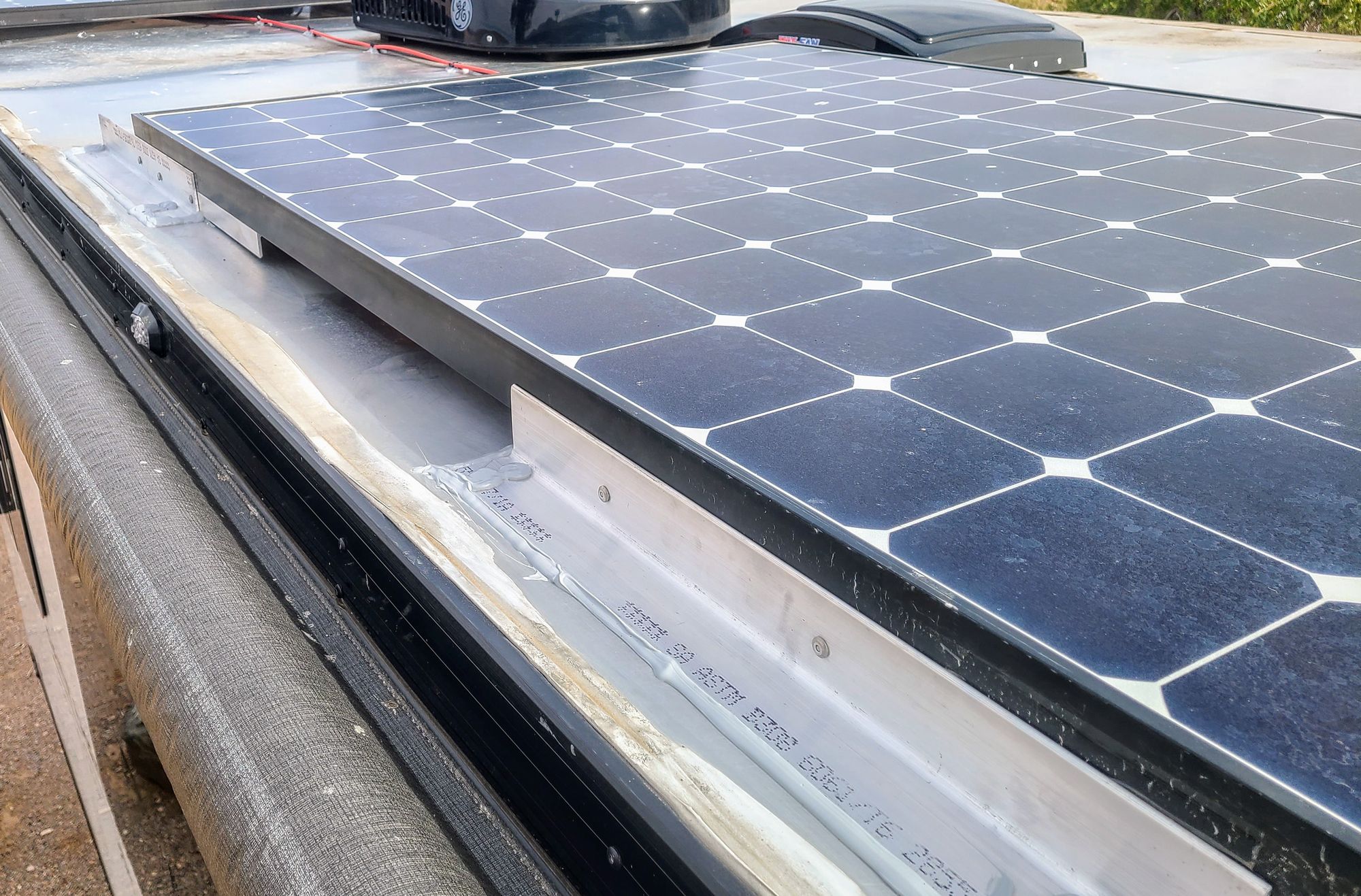
It just goes to show that things are not always as they seem at first glance when it comes to life on the road. We've always been proud of living an environmentally-conscious life, and we wouldn't want to give that up when traveling full-time. We're happy that we have found ways, both through conscious changes and necessary concessions on the road, to be able to continue these efforts to keep our footprint low. So much of our life now involves exploring the outdoors, and we've gotten to see how truly beautiful our earth is. We want to be able to enjoy her beauty for as long as possible, and we want future generations to, too.

